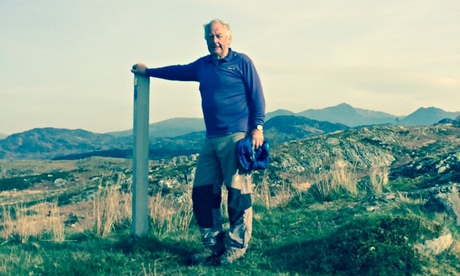
John Ellis Roberts, who has died aged 70 in a climbing accident, was for more than three decades head warden of the Snowdonia national park, and a prime mover in setting the mountain rescue organisation in north Wales on a more professional footing.
In 1965, he qualified as a mountain guide and was appointed to the Snowdonia post. Recreational pressure was growing on the mountains of north Wales, and he oversaw the development of a warden service that was a model of its kind. He was a pioneer in maintaining and improving footpaths on the more popular mountains – work that at the time was resisted by an elitist mountaineering establishment, who argued that it made summit access too easy for the unaware masses.
In seeking to protect the physical fabric of the hills from erosion, John could be found out on the hillsides in all weathers directing, demonstrating and labouring with the footpath maintenance gangs. The great finger stones raised to mark the Watkin path and Miners' track descents from the summit of Snowdon, invaluable to the inexperienced, were his idea. He also negotiated access with local farmers, who were often resentful of weekenders' careless ways.
John was brought up in the slate town of Blaenau Ffestiniog, his mother a staunch chapel goer, his father and grandfather both quarrymen. A monthly treat as a child was to be taken up to his father's place of work, where the message was adamantly put over: "I don't want you to come up here to work."
On leaving the town's grammar school, John became a junior draughtsman at nearby Trawsfynydd nuclear power station – a job that provided him with the means to pursue his interest in mountaineering.
He had started climbing early, exploring the innumerable crags of his home ground. The work at Trawsfynydd and later for the Welsh Water Authority enabled him to travel to more distant hills, including the Alps. He became a more than proficient skier who delighted in leading parties along the Haute Route from France to Switzerland.
He used the Snowdon post to argue long and hard that the rescue services should evolve from ad hoc and voluntary groups into well-trained and equipped staff working from permanent bases. It was a field in which he was very proficient: I remember the 1974 rescue of an injured man from the crevassed stance on Longland's Climb, 400ft up the forbidding precipice of Clogwyn Du'r Arddu on the north flank of Snowdon, which he conducted under hazardous conditions with breathtaking efficiency.
He was the first in Wales to follow the example of Hamish MacInnes of Glencoe, in training and using dogs for mountain search and rescue operations. John's first rescue dog, Bonn – a highly intelligent German shepherd – came to him as gift from Hamish in 1966, and proved her worth almost immediately by finding alive a woman lost for several January days in the Eifionydd hills.
John's inventiveness in tailoring equipment to the task helped not only in rescuing people but also in recovering innumerable crag-fast sheep (the device he invented for this is still called the Roberts bag).
In 1976 he was made MBE. He retired in 1999 and was able to devote more time to mountain activities with his partner, Tracey Evans, who survives him. A first marriage, to Bronwen, ended in divorce.
• John Ellis Roberts, mountaineer, born 6 August 1943; died 17 July 2014

